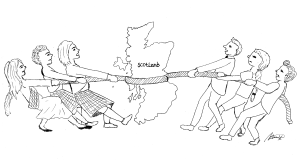
 When I landed in Edinburgh 10 days ago, I expected to be bombarded with referendum propaganda. I anticipated people shouting on street corners, shoving pamphlets in my face and banners plastered on every lamppost and shop window.
When I landed in Edinburgh 10 days ago, I expected to be bombarded with referendum propaganda. I anticipated people shouting on street corners, shoving pamphlets in my face and banners plastered on every lamppost and shop window.
To my surprise, besides the occasional “YES” or “NO” posters, that has not been the case. Another one of the Georgetown students joked that back home, Americans get harassed more over town mayoral elections than the Scots are over this referendum.
Granted, this is a slight exaggeration, but it does make a point about the general atmosphere over here. It’s clear that this is not a typical election. The political circus we, as Americans, are accustomed to during an election year does not mirror the situation I have experienced in Scotland. The distinct weight borne by tomorrow’s outcome has created a sober atmosphere, rather than the hysteria I expected.
There seems to be a mutual understanding among the Scottish people about the exceptionally personal nature of this decision.
Unlike a typical election, the choice to become an independent nation is not one that can be swayed by catchy campaign graphics, inspirational sound bites or vicious attack ads. This is not a scenario where one can simply vote according to party lines. Everyone I have personally spoken with on this topic has been incredibly introspective about their position and contemplative about the impact the vote will have on their lives.
This past week, another Georgetown student and I got the chance to speak to two Scottish citizens about the referendum. The first, a woman of about 40, stated she was a “no” vote, and the gentleman, in his late 20s, was decidedly a “yes” vote.
When posed the question about which side they supported, the two looked at each other and laughed. It was evident that they had talked about this before. Both knew each other’s answers already. The woman jested, “Oh no, don’t get him started!”
I have found this type of response to be pretty typical. But, as we listened to each of them explain their positions, I was struck both by the legitimacy of each argument and the equal consideration each person gave to the other’s side.
In a similar situation, I spoke to two University of Edinburgh students about how they are planning to vote. Just as before, the two friends already knew which way the other was voting, and once again, one was a “yes” and one was a “no.”
This time, though, I was curious to ask what they thought the consensus would be among young people in general. From their perspective, they said, it seemed to be 50/50. I asked if the younger generation tends to be more vocal about the referendum, and again the answer was ambiguous. Apparently some are, some are not. But, the one thing they did say was that everyone they know is planning to vote.
The permanence and severity of the decision that will be made this coming Thursday has changed the tone of this election from any other political race. Whatever Scotland decides, Scotland will live with it for a very long time.
The implications of this decision will have major ramifications for the economy, domestic politics, the health care system, membership in the European Union, education polices and an array of other issues that are under constant debate in the media. For this reason, I think the people here have been prompted to participate in politics at a level beyond what is usually observed, both in Scotland and other democratic nations around the world.
The Scottish people have had a long time to carefully deliberate on both sides of the argument and gather the facts. Tomorrow, Scottish voters will arrive at the polls with a level of consideration and knowledge base behind their vote that has become rare in electoral politics.
Being in Edinburgh has not given me a firm sense of the probable outcome, but the degree of civic political engagement I have witnessed here has been refreshing. I understand that many Americans may not see the relevance of this referendum in their own lives, but we should all be paying close attention to what is going on in Scotland.
The Scottish people have shown through the course of this entire debate that having the power to vote means nothing without immersing yourself in the issues, asking critical questions and trying to cultivate real solutions. The lesson every American voter should take away from the Scottish independence referendum is that politics should not be happening around you, but through you.
Regardless of tomorrow’s vote, I am hopeful about the outcome because I know the people of Scotland have taken the necessary time to determine what this vote will mean for them as individuals, as citizens and as a nation. Scotland decides.
Caroline Gelinne is a junior in the College. She is studying abroad at the University of Edinburgh this semester.









